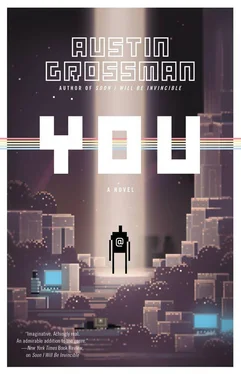Icame in the Saturday after we shipped to look at the game we had finished, right at the last possible instant. No matter what happened, I wanted to see what we had before they took it away.
WAFFLE was so legally radioactive at that point that we’d be releasing it as shareware—all the tools, all the source code, a game construction anthology for the ages. Focus had, sadly, become the prey of Bain Capital, which managed to make a modest profit from its assets, either because of the unexpected value of cask-aged intellectual property or its superfluity of high-end office chairs.
Matt, Don, and I were forming Magus Games, a start-up stealth-funded by Vorpal, now flush with cash. The film rights for Clandestine had sold for more than what I would have believed possible. Hollywood had decided to start taking notice of video games; I could almost believe we were beginning to scare them a little. Darren immediately packed up and moved to a house in Pasadena, and was reportedly “in meetings.” Lisa walked into an MIT doctoral program after a lengthy interview and presentation of her work, and the discovery that very few people could keep up with her in conversation.
For now, I just wanted to look around with the virtual camera and see what this place was. I let it spawn in at a random location. Take me anywhere, I thought. I don’t care.
We wound up on a hillside far out on the eastern continent. A half-elven prospector looked out in the blue early dawn over a misty virtual pine forest. Water condensed in tiny drops on his leather armor. I could see him breathing as his standing-still animation cycled; I could almost feel the moist air in his hybrid half-faerie lungs, his narrow eyes watching the pixelated trees in the far distance.
This was Simon’s vision brought to life as truly as I could make it. Display technology didn’t matter; who cared how many polygons the trees had? I could feel this world breathing.
I drew the camera back, kicked the time scale up, and watched days and then years pass. Smoke ascended from a solitary woodcutters’ camp in the ocean of pine. Every few turns there was a low-percentage chance the forest would spread out and become fields, or die and become desert, or a tribal people would settle there and form a village.
Clouds gathered, herded around by a rough climate model, towering over plains in jagged cubical stacks, shadowing castles and armies on the march, piling up against the mountain ranges that ribbed the continents. Rivers and streams trickled from the mountains’ heads and shoulders, through bumps and ridges, down into the plains. There was no geologic time per se, but we registered a few types of terrain-altering events, the rare earthquake or volcano, the once-in-an-era feat of earthshaking high magic or divine retribution.
Simple probability pyramids governed the world’s production. Fields generated crops in appropriate proportions, more staples and fewer luxury goods; regional imbalances generated trade. Forests generated x amount of game, and x /10 predators, and then rarer exotic or magical fauna, populations swelling and shrinking by Malthusian logic. The seas generated fish and whales and, in the depths, the leviathan and kraken and the odd stranger things, ancient things that belonged on other planes but found their way into the deep ocean. When a dragon, our apex predator, appeared, it automatically aggregated treasure and laid waste to the surrounding countryside. (It is a privilege of my profession to know where dragons come from.)
In our toy economy, all the world’s wealth started at the top of the supply chain, as gold and wood and leather and food. Dwarves and humans dug for minerals in the deep folds of the irregular crust, and so jewels and metals and rarer things propagated along caravan routes and clogged in the cities then radiated outward as crafted goods. X number of ingots became a dagger or a sword, so many hides became a cloak or a suit of leather armor, and so forth for all the myriad daggers and bridles and lanterns and helmets and vestments and statuettes and bowstrings and scroll cases that equip and ornament the world.
The supply chain had a top, and it also had a bottom—a benthic sludge of used boots, misfired arrows, torn surcoats, sunken ships, blunted weapons, and burned siege engines that simply vanished from the simulation after a set time. The economy worked, but we were long past understanding why, because every employee who had ever touched the system—which was almost every designer or programmer in the building—had added their own little algorithmic tweak to it, and by now the price-setting algorithm had fifty different half-remembered undergraduate versions of Keynes or Weber or Adams feeding into it. Add to this the nonlinear fluctuations born from player behavior—tweaks to the magic system revalued every magical herb and powder, and every infusion of treasure every adventuring party hauled up from the depths, to upset the markets like a diver cannonballing into a neighborhood pool. It still worked suspiciously well. In fact, I suspected that large sections of the economics programming were a front, and that Lisa ran it all from a little console, four or five sliders controlling pricing and production as though it were a tiny Soviet-style command economy.
Cities and settlements held together in fanciful political congregations—the lands sparkled with barons and dukes, viziers and khans, elven kings, orcish warlords, dwarven magnates, tribal elders, Lich Kings, robber-chieftains, matriarchs, regents, god-emperors, and petty lordlings who ruled a stockade and five or six men-at-arms, an underground convocation of thieves.
After much overpromising and backtracking from Toby, we agreed that yes, there would be a day-night cycle running at eight to one, roughly three hours per twenty-four-hour day. Things were a little hacked at night, colors were wrong and nothing shadowed correctly, but there were three moons and they were beautiful.
Elves (high / wood / dark) lived in dark forests or fanciful spun-sugar Bavarian castles. Dwarves lived in caves and forged things. Orcs lived their economically ineffectual tribal lives in the wastelands. Humans did their bit, filled up the map with farmers and thieves and priests and castles. Lizard men lived in deserts and swamps and carried on their biologically doubtful lives in isolation. Exotic horrors lurked in the darkness. Daemons, devils, spirits, giants, benevolent jinn. Extraplanar magi and ethereal predators that intruded into the world from extraplanar civilizations, through gates or summonings or natural rifts. We’d get to these other worlds in fourth- or fifth- or sixth-edition rules. The toughest adventurers would still be killed—by undetectable traps, by unpredictable monster types, or, if necessary, by mobs or armies of midlevel monsters. There would be epic deaths, throw-the-controller-across-the-room deaths. Where necessary, there were gods.
History progressed, blissfully free of historical or political or technological progress. Kingdoms rose and fell over the millennia, but there was no trend toward democracy, no Enlightenment, no industrial modernity, no Luther, no Hume, and absolutely, definitely, no gunpowder. No Principia Mathematica or Declaration of Independence. We held certain truths to be self-evident, but those truths were that elves hate orcs and wizards can’t wear metal armor.
What we had instead was world history frozen in an eternal thirteenth century—or, rather, something more complicated than that. It’s more as if history had paused forever during eighth-grade study hall, a Thursday afternoon free period stretched out into countless millennia, where knights and castles mix in with fantasy novels, fairy tales, vague orientalist fantasies, Arthurian kitsch, Norse mythology, Star Wars, Paradise Lost, medieval travelogues, heavy metal album covers, and dimly remembered historical trivia.
Читать дальше





![Ally Carter - [Gallagher Girls 01] I'd Tell You I Love You But Then I'd Have to Kill You](/books/262179/ally-carter-gallagher-girls-01-i-d-tell-you-i-lo-thumb.webp)






